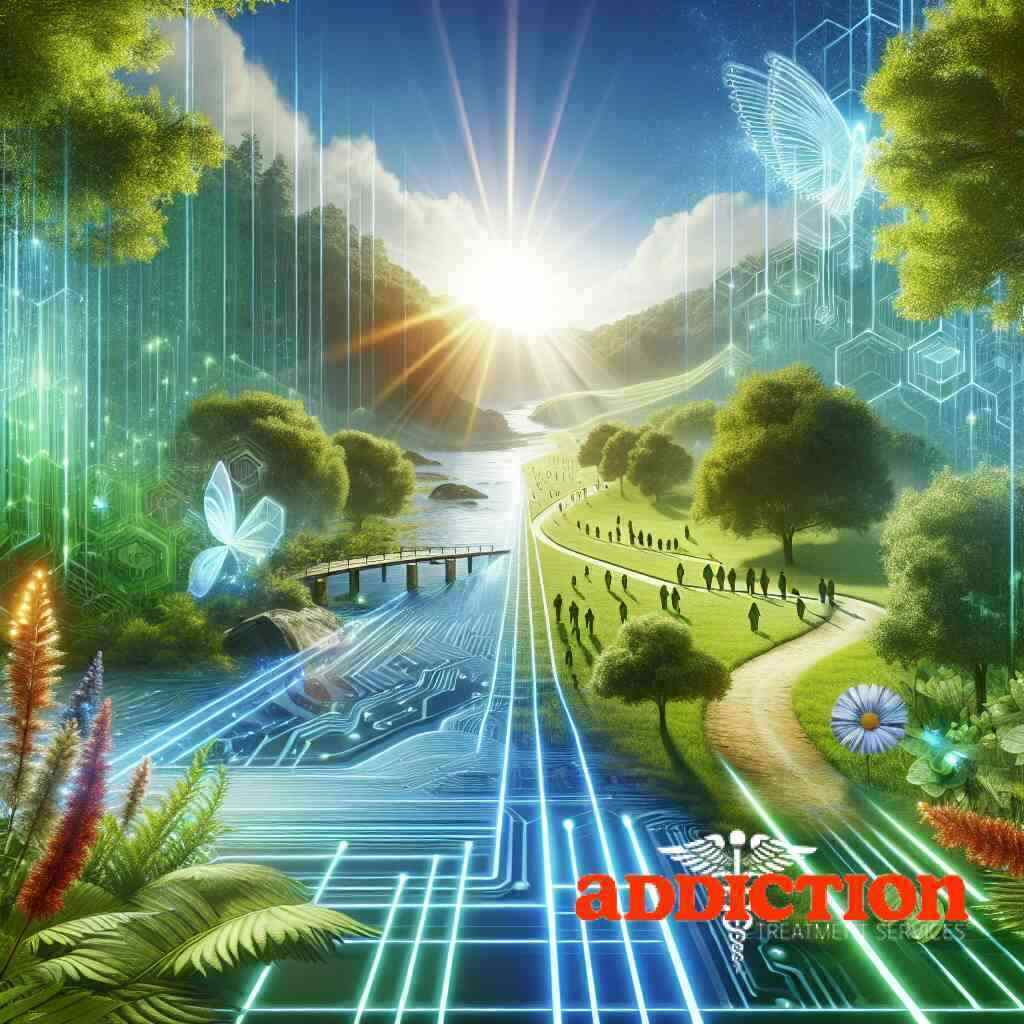 Posted On: 02/19/2025
Posted On: 02/19/2025Embarking on the 2025 Journey of Recovery
Understanding Modern Addiction Recovery Pathways
In 2025, the journey of addiction recovery has evolved remarkably. Understanding modern addiction recovery pathways in 2025 demands a fresh look at how treatment processes have adapted. The landscape is more dynamic now, integrating a wide range of methods that cater to the nuanced needs of individuals navigating addiction treatment services near you. Innovations in therapy and support are reshaping how we perceive recovery, highlighting the importance of personalized treatment strategies. These advanced pathways empower those in recovery by addressing the root causes of addiction, ensuring that every step taken aligns with the individual’s unique journey toward sobriety.
The Role of Technology in Navigating Treatment Options
Incorporating technology into addiction treatment has transformed how individuals access and engage with recovery services. The rise of e-therapy is a testament to this shift, allowing for more flexible and consistent support. By exploring therapy through technology, individuals can harness tools that offer real-time assistance, ultimately fostering a more interactive and adaptive recovery environment. Digital platforms provide accessibility to resources that were previously out of reach, enabling continual engagement with healthcare providers and support systems. This technological integration ensures that individuals have access to timely interventions and that family members remain informed and supportive throughout the recovery process.
Recognizing Signs of Substance Misuse and Dependence
Understanding the signs of substance misuse is crucial for timely intervention and effective treatment. Early recognition can prevent the escalation of dependence, reducing the risk of long-term health implications. As individuals and families navigate addiction treatment services, it becomes paramount to develop awareness around these signs, which can often include behavioral changes, withdrawal symptoms, and neglect of duties. By fostering a culture of awareness and open conversation, communities can better support those in need. Recognizing the symptoms and seeking help from reputable centers ensures a structured approach to recovery, reinforcing the importance of integrating mental health in recovery pathways and the broader context of addiction treatment services.
Mapping the Landscape: Local and Personalized Treatment Solutions
Unveiling 2025 Trends in Local Addiction Recovery Resources
In 2025, navigating addiction treatment services near you reveals a rich tapestry of localized solutions fashioned to meet the diverse needs of individuals seeking help. Emerging trends showcase an uptick in community-based programs that leverage local resources, enhancing accessibility and fostering a sense of belonging and mutual support among participants. These local addiction recovery resources are adapting to integrate more community involvement, opening pathways for collaboration with local entities. The landscape is also marked by partnerships between treatment centers and local health services, widening the scope of care available to address the totality of an individual’s needs. Embracing these trends involves recognizing the importance of local context in recovery, which is increasingly being seen as pivotal in crafting impactful treatment solutions.
Personalized Treatment Plans: Tailoring Recovery for Success
The personalized addiction treatment spotlight has brightened, underscoring the significance of bespoke recovery plans in 2025. Personalized treatment plans are at the core of successful recovery, acknowledging the unique circumstances and challenges faced by each individual on their journey to sobriety. These plans incorporate detailed assessments to paint a comprehensive picture of the individual’s needs, thereby customizing therapeutic approaches, support systems, and interventions. By focusing on personalized addiction recovery solutions, treatment centers are able to craft strategies that resonate deeply with patients, aligning with their personal recovery goals and potential roadblocks. This tailored approach not only enhances the efficacy of the treatment but also boosts the individual’s confidence and commitment, fostering a more sustained recovery.
Innovative Addiction Therapies: Breaking New Ground
2025 stands as a testament to cutting-edge addiction therapies, continually redefining treatment paradigms. These groundbreaking methodologies include advances such as neurofeedback and virtual reality therapy, which offer immersive experiences that reshape the cognitive and emotional patterns tied to addiction. With a focus on holistic treatment avenues, these innovations are crafted to disrupt traditional pathways, engaging patients in novel ways that stimulate active recovery and self-awareness. The evolution of therapy options illustrates the sector’s commitment to advancing addiction treatments while continuously generating new insights into addictive behaviors. As these therapies break new ground, they inevitably challenge and extend the boundaries of conventional addiction care, providing additional avenues for recovery tailored to the modern-day patient’s needs.
Integrating Mental Health: Holistic Recovery Approaches
Navigating the intricate dance between addiction and mental health in 2025 requires a nuanced understanding of integrating mental health inintoecovery. Holistic recovery approaches in addiction treatment have emphasized the symbiotic relationship between mental health services and addiction recovery support. This integration prioritizes addressing co-occurring disorders through comprehensive dual diagnosis programs, which assess mental health conditions alongside substance use disorders. By doing so, treatment providers can offer a more well-rounded form of care, one that considers the complex interplay of mental health and addiction. This holistic focus serves as a foundational shift towards recovery strategies that honor the influence of mental wellness on achieving sobriety, ultimately guiding patients through a recovery process that is as much about mental healing as it is about overcoming substance dependence.
The Search for Sobriety: Effective Outpatient and Detox Solutions
Choosing the Right Rehab Program: Key Considerations
Selecting the appropriate rehab program is crucial for a successful recovery from addiction in 2025. Individuals must first assess their specific needs, including the severity of their addiction and any co-occurring mental health disorders. Treatment facilities offer various programs such as residential treatment, outpatient care, and medication-assisted treatment tailored to these requirements. It is essential to consider the program’s treatment philosophy and the qualifications of its staff. Also, check if the facility provides comprehensive services, including dual diagnosis treatment centers, in detail to ensure a holistic approach to recovery. Evaluating the availability of continuous care for addiction after initial treatment is another critical aspect to consider, as it influences long-term sobriety.
Finding Detox Centers: First Steps Toward Sobriety
Embarking on the path to sobriety often begins with detoxification, a vital initial step in the treatment process. Detox centers are specifically designed to manage withdrawal symptoms and stabilize individuals medically. As a critical part of choosing the right detox facility, one should look for centers that offer 24/7 medical supervision and cater to specific needs, such as opioid addiction or alcohol dependence. Additionally, understanding the detox process and its objectives-such as cleansing the body of toxins, can provide clarity and reassurance. It’s also worth exploring facilities that align with Florida alcohol and drug treatment services, as they might offer specialized programs conducive to a successful detox journey. Ultimately, finding the right detox center is about ensuring safety and comfort and setting the foundation for effective ongoing treatment.
Exploring Drug and Alcohol Rehabilitation Services
Understanding the landscape of drug and alcohol rehabilitation services is essential when navigating addiction treatment options near you. These services range from intensive inpatient programs to flexible outpatient care, each offering unique benefits tailored to individual recovery goals. Familiarizing oneself with local rehabilitation options, including residential treatment insight, helps in making informed choices about the most suitable environment for personal healing. Rehabilitation centers often include a combination of therapeutic modalities such as cognitive behavioral therapy, group counseling, and educational workshops. Moreover, exploring drug rehabilitation and treatment avenues can provide a comprehensive understanding of how these services can assist in achieving long-term sobriety. By thoroughly investigating these options, individuals are better equipped to embark on a recovery path that aligns with their specific needs and circumstances.
Insurance for Addiction Services: Navigating Financial Aspects
Navigating the financial aspects of addiction treatment can be daunting, but understanding insurance options plays a pivotal role in accessing quality care. Many treatment facilities provide a broad range of services, from detoxification to comprehensive addiction care solutions, which are often covered under various insurance plans. It is crucial to explore insurance insights for addiction services to ascertain the extent of coverage offered by different providers. Contacting treatment centers directly can also yield valuable information on accepted insurance providers and any self-pay options available. Understanding policy details, such as co-pays and deductibles, ensures that financial barriers do not impede the pursuit of recovery. By leveraging available resources, individuals can make informed decisions about financially viable treatment pathways, thus removing one of the major hurdles in accessing effective addiction recovery services.
The Power of Support: Family and Continuous Care in Recovery
Harnessing Family Support in the Recovery Process
Family support plays a crucial role in the recovery process, forming the underpinning of successful addiction treatment plans. In 2025, the dynamics of recovery increasingly incorporate family members as active participants in the healing journey. By understanding the importance of family in coping with addiction: family role, treatment centers emphasize open communication and education. This nurturing environment helps individuals navigate their addiction treatment services near ythemwith a stronger support system. Families are encouraged to participate in therapy sessions and workshops, which foster a collaborative approach to overcoming substance dependence. As families learn coping strategies and relapse prevention techniques, they become essential pillars in reinforcing continuous support and enhancing overall recovery outcomes.
Dual Diagnosis Treatment Centers: Bridging Behavioral Health
In the complex landscape of recovery, dual-diagnosis treatment centers are instrumental in bridging the gap between addiction and mental health. These centers are designed to address co-occurring disorders, offering comprehensive strategies that cater to both substance use and mental health disorders. Understanding the significance of dual diagnosis treatment centers in detail is pivotal for those seeking holistic recovery. These centers utilize an integrated approach, ensuring that treatment plans cater to the intertwined nature of mental health and addiction. By offering personalized care and employing behavioral health experts, individuals can receive simultaneous treatment for both conditions, promoting a more balanced and sustained recovery journey. The inclusion of behavioral therapies helps patients develop coping mechanisms, addressing the root causes of addiction and mental health issues comprehensively.
Comprehensive Treatment Solutions: Ensuring Continuous Care
The path to recovery is ongoing, and continuous care is vital to prevent relapse and maintain sobriety. Comprehensive addiction care solutions embody this principle by offering a seamless transition from intensive treatment to aftercare services. Continuous care improvement programs facilitated by addiction treatment services near you focus on supporting individuals well beyond their initial detox and therapy phases. These programs often include sober living arrangements, ongoing counseling, and support groups, ensuring patients continue to receive guidance and encouragement on their recovery journey. Such solutions are tailored to the individual, taking into account their unique challenges and triumphs, thus bolstering their resolve to maintain sobriety. As individuals engage with these extended services, they develop sustainable recovery strategies, underlining the necessity of comprehensive, ongoing support in successful addiction treatment.
Overcoming Substance Dependence: Navigating Rehab Options
Navigating the myriad of rehab options available in 2025 requires an understanding of various addiction treatment programs that cater to different needs. Whether an individual requires inpatient care or prefers outpatient solutions, the range of rehab options is vast. By exploring drug rehabilitation and treatment, individuals can assess programs that align with their circumstances and recovery goals. Treatment facilities offer an array of services, such as behavioral therapy, medical detox, and residential treatment insight, ensuring a comprehensive approach to overcoming substance dependence. Additionally, programs like intensive outpatient services and sober living homes provide flexibility for those balancing life commitments while pursuing recovery. With a clear map of the available rehab options, individuals are empowered to make informed decisions that support their journeytowards a healthy, addiction-free life.
The Road Ahead: Navigating the Future of Addiction Treatment
Beyond 2025: Future Perspectives on Addiction Recovery
As we look beyond 2025, the landscape of addiction recovery continues to transform, driven by advancements in therapeutic methodologies and a heightened understanding of mental health. The future presents a robust model that integrates technology and behavioral insights to provide more precise and effective recovery pathways. This evolution underscores the importance of ongoing research and innovation in addiction consequences and challenges. Advances in cognitive-behavioral approaches and personalized medicine are expected to dominate the recovery space, allowing treatment plans to be even more tailored to individual needs. This personalized approach promises not only to enhance recovery outcomes but also to mitigate relapse rates, solidifying long-term sobriety. Moreover, efforts to destigmatize addiction will be pivotal, fostering environments where individuals feel valued and supported throughout their recovery journeys.
Innovations in Behavioral Health Services and Relapse Prevention
Innovations play a crucial role in evolving behavioral health services, offering new insights into how addiction is addressed and managed. Techniques such as neuroadaptive therapies and digital health solutions are revolutionizing how we understand the impact of addiction treatment on the brain. These cutting-edge interventions prioritize an in-depth analysis of neural pathways, providing opportunities to develop treatments that directly tackle the neurological components of substance misuse. Additionally, the integration of Artificial Intelligence in monitoring relapse indicators creates a proactive approach to relapse prevention. Through predictive analytics, these innovations offer real-time insights and adaptive strategies that better equip individuals to manage triggers and stressors effectively, ensuring sustained recovery.
Exploring Effective Outpatient Support and Recovery Support Services
Exploring future-oriented outpatient support and recovery services reveals a multifaceted approach dedicated to fostering enduring healing. As outpatient solutions become more refined, they offer greater flexibility and accessibility, catering to the realities of individuals balancing recovery with daily commitments. Emphasizing support networks and community involvement forms a cornerstone of these evolved services. Platforms are being designed to deliver ongoing support that embraces digital outreach, personalized coaching, and peer-driven initiatives, fostering a comprehensive framework of care beyond the confines of traditional therapy. Moreover, continuous education and skills development become integral, providing individuals with resilience tools essential for navigating life post-recovery. By placing a spotlight on community-driven recovery support services, these initiatives not only enhance individual recovery outcomes but also contribute to a more empowered, sober collective.
Frequently Asked Questions
Question: What are 2025 addiction treatment trends that make Addiction Treatment Services a trusted option?
Answer: In 2025, addiction treatment trends emphasize personalization, technology integration, and community involvement. Addiction Treatment Services is at the forefront, offering comprehensive addiction recovery resources that cater to the nuanced needs of individuals. We prioritize personalized treatment plans that acknowledge unique circumstances and challenges. Our use of cutting-edge therapies, such as virtual reality therapy and neurofeedback, showcases our commitment to innovative addiction therapies. By integrating mental health services with addiction care, we ensure a holistic approach that addresses both substance misuse and co-occurring disorders, making us a trusted choice for those seeking effective outpatient support and comprehensive recovery solutions.
Question: How do Addiction Treatment Services assist with finding detox centers as the first step toward sobriety?
Answer: Embarking on the journey to sobriety often begins with detoxification, and Addiction Treatment Services simplifies this crucial first step. Our extensive directory helps individuals find detox centers that offer 24/7 medical supervision to manage withdrawal symptoms effectively. We provide detailed insights into facilities that specialize in specific addictions, such as opioid addiction or alcohol dependence, ensuring that the detox process is safe and comfortable. Our focus on aligning with state-specific treatment services, like those in Florida, guarantees access to specialized programs, laying a strong foundation for ongoing recovery. We ensure you’re well informed about the detoxification process and the available options, making us a reliable partner in your journey.
Question: According to the blog post ‘How to Navigate Addiction Treatment Services Near You in 2025, ‘ how can technology in addiction recovery enhance the therapy experience?
Answer: According to the blog post ‘How to Navigate Addiction Treatment Services Near You in 2025?’, technology has become a transformative force in addiction recovery. At Addiction Treatment Services, we believe in harnessing technology to make recovery services more accessible and engaging. The rise of e-therapy has allowed for flexible and consistent support, enabling real-time assistance that adapts to individual needs. Digital platforms offer a wealth of resources that were once out of reach, ensuring continual engagement with healthcare providers. By integrating technology, we enhance therapy experiences and provide family members with crucial updates, reinforcing the importance of support networks and ensuring a collaborative approach to achieving sobriety. Exploring Advanced E-Therapy Options with Addiction Treatment Services
Question: How does integrating mental health in addiction care improve recovery outcomes at Addiction Treatment Services?
Answer: At Addiction Treatment Services, we recognize the importance of integrating mental health into addiction care to improve recovery outcomes. Our holistic recovery approaches emphasize comprehensive dual diagnosis programs that address both mental health conditions and substance use disorders. By assessing these co-occurring disorders, we offer well-rounded care that considers the intricate interplay between mental health and addiction. This integration leads to more customized recovery strategies, allowing us to tackle the root causes of substance misuse as well as mental health challenges. With a focus on understanding substance misuse and enhancing behavioral health integration, we provide supportive environments that foster sustained sobriety and mental wellness. Guide to Advanced Holistic Addiction Care Services
Question: What role does family support play in the recovery process at Addiction Treatment Services?
Answer: Family support is a cornerstone of the recovery process at Addiction Treatment Services. We actively involve family members as integral participants in the recovery journey, believing that a strong support system is vital for overcoming substance dependence. Through open communication, family therapy sessions, and educational workshops, we empower families with coping strategies and relapse prevention techniques. Top 10 Strategies for Managing Relapse Prevention Techniques As they learn to navigate addiction resources alongside their loved ones, families become essential pillars of continuous support, enhancing the overall recovery experience. Defining Recovery Support for Families By fostering a nurturing environment, we ensure that individuals are surrounded by encouragement and understanding, which is key to successful long-term recovery.




